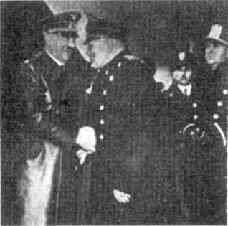|
|
The Fall of Paris
Internationale Situationniste #4 (June 1960)
Translated by Reuben Keehan
IN THE PERIOD of the dominant culture's dissolution, Paris was the main center of research, the point of concentration for experiments by individuals coming from all modern countries, where the same total problem of culture had developed. This role, which Paris held almost continuously until the end of the second world war, has now come to an end.
Without going into every condition that has favored the geographical polarization of the new currents of modern culture and their reversal, we will content ourselves to remark that the cultural avant-garde of our era has been strongly bound, not only ideologically but practically, to the general affirmation of freedom: initially during its negative phase, because it expresses precisely the negation of the dominant organization of life; and then — and all the more — during the phase of constructive research, with the attempted invention of new instruments and new uses in social life.
 This freedom, which can obviously not exist under an authoritarian political regime where the material authority of culture appears even in the wretched author of The Voices of Silence [André Malraux], has in fact already been eliminated in the last regime. Capitalist society itself is therefore democratically governed by leftist personnel, and to this reformist and progressive style corresponds the unofficial but practically monopolized reign of impotence and repetition in the cultural sector that rather than mimicking the grandeur of the past, mimics the experience of novelty (cf. the outcome of a magazine like Les Temps Modernes compared to its initial pretensions). In the same movement, the political extremists of this Left above all do not want to disrupt the social order; and the intellectual extremists above all do not want to disrupt the conventional frameworks of an empty culture, nor the tastes of modernist spectators. The permanent crisis of the French bourgeoisie, even when it reached the culminating point of May 1958, did not find the revolutionary solution it needed. Paris has become more of a museum than a city, complete with security guards. This freedom, which can obviously not exist under an authoritarian political regime where the material authority of culture appears even in the wretched author of The Voices of Silence [André Malraux], has in fact already been eliminated in the last regime. Capitalist society itself is therefore democratically governed by leftist personnel, and to this reformist and progressive style corresponds the unofficial but practically monopolized reign of impotence and repetition in the cultural sector that rather than mimicking the grandeur of the past, mimics the experience of novelty (cf. the outcome of a magazine like Les Temps Modernes compared to its initial pretensions). In the same movement, the political extremists of this Left above all do not want to disrupt the social order; and the intellectual extremists above all do not want to disrupt the conventional frameworks of an empty culture, nor the tastes of modernist spectators. The permanent crisis of the French bourgeoisie, even when it reached the culminating point of May 1958, did not find the revolutionary solution it needed. Paris has become more of a museum than a city, complete with security guards.
Despite their noisy bickering, all of France's 'progressive' organizations essentially agree between themselves — as they do with their cousins lucky enough to hold power: the basis of this accord, the greatest interest of blood ties, is the preservation of the dominant society. At best, they propose a few minor adjustments. Since the political regime has changed, this fundamental accord has been reinforced and enlarged once more. It is expressed, and remains expressed, by the absolute decision to keep the peace.
Almost every revolutionary thinker who has learned the history of the last thirty years of the workers' movement in one go has been seized by a passion for renewal in reading Kruschev's disclosures to the Twentieth Congress of his party. But these people have not gone far enough — or fast enough — and most are already tired, or have returned to the eclecticism that they discover with amazement.
Bourgeois leftists can call themselves extremists with a sense of ease, because what they imagine as the most extreme revolutionary violence (the bureaucratic reassurance of the French Communist Party) is not so far from their habits; and also to affirm, as great lords, their indifference toward the decor of the moral and patriotic order of France in the hour of Algeria. But this leftism does not seem to be up to the task of forcing a single convention into question, even at the lowest level. Thus, Kast and Doniol-Valcroze (France-Observateur, 25-2-60) responded to criticisms concerning futility and the accumulation of social thought in their films by saying that 'if it must have material engagement with cinema, then it concerns people,' and not films.
 The absolute lack of assistance of French 'revolutionary' organizations to the insurgent Algerian people naturally produces the generalization of purely individual reactions (deserters, French agents with ties to the F.L.N.). In the presence of these facts, the Left shows what its worth: Bourdet panics at the idea that Francis Jeanson's network helps to discredit 'the entire Left's peace action' when this discredit is inscribed in six years of total abstention. The moralist Giroud, in L'Express on 10 March, was amazed more than anything else at assisting a great many irresponsible children to desert ('How many twenty year old boys have made up their minds with enough force to lucidly carry out one of the gravest acts that can be committed by man?'). Can't they wait? Not just pacifists, but deserters at their age? We hear talk in the national community of not giving up, of not crossing the threshold. When the threshold is that of prisons where Gérard Spitzer, Cécile Decugis and Georges Arnaud reside, the left has the good taste to not raise their voices in defense. Those who think that there is anything left to 'betray' outside the cause of international exploitation can certainly be intimidated for a long time by the blame of treason. The absolute lack of assistance of French 'revolutionary' organizations to the insurgent Algerian people naturally produces the generalization of purely individual reactions (deserters, French agents with ties to the F.L.N.). In the presence of these facts, the Left shows what its worth: Bourdet panics at the idea that Francis Jeanson's network helps to discredit 'the entire Left's peace action' when this discredit is inscribed in six years of total abstention. The moralist Giroud, in L'Express on 10 March, was amazed more than anything else at assisting a great many irresponsible children to desert ('How many twenty year old boys have made up their minds with enough force to lucidly carry out one of the gravest acts that can be committed by man?'). Can't they wait? Not just pacifists, but deserters at their age? We hear talk in the national community of not giving up, of not crossing the threshold. When the threshold is that of prisons where Gérard Spitzer, Cécile Decugis and Georges Arnaud reside, the left has the good taste to not raise their voices in defense. Those who think that there is anything left to 'betray' outside the cause of international exploitation can certainly be intimidated for a long time by the blame of treason.
A few aspects of the political present have hastened the end of Paris' privileged role in experimental culture. In any case, this withering was inevitable. The international concentration in Paris expresses nothing but old habits. The new globally unified culture can only be developed where authentically revolutionary social conditions appear. With the victory of the new form of society, it is no longer fixed at such and such a privileged point; it spreads and changes everywhere. In the end, it cannot be strengthened in the majority of the nations of the white race. Before the worldwide blending of races that is both inevitable and desirable, yellow and black people who are beginning to take their destiny into their own hands have taken their place at the forefront. In the self-realized emancipation of colonized and developing peoples, we recognize the possibility of skipping the intermediate stages experienced elsewhere, as much in industrialization as in culture and very use of a free life for all. The Situationist International accords paramount importance to linking up with the avant-gardist elements of North Africa, Latin America, and Asia: for the future and beyond.
|
